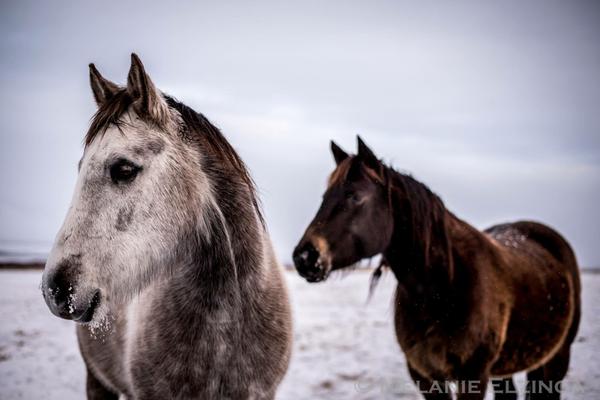
It’s time to once again pick up the pen, so to speak, and get some words out to you to let you know how things are going on Alderspring.
Christmas is always a very nice time of year in the remote Pahsimeroi, and this year was extra quiet because we decided to have a Christmas with just us. Sure, we had caroled around with a van full of folks to aging people in the Valley a few days before, but on Christmas Day it was just our family–unusual as every year I can remember we invited a mob of folks in who had nowhere else to go. After the beeves were fed and other chores done, I threw three of Josh’s Alderspring pastured chickens on the Weber, and we enjoyed them immensely. Kids consumed even the wings, and the backs made a fine Holiday broth for the weekend.
Winter has settled into its “bleak midwinter” state. We’ve had enough subzero nights that ice reigns hard on the ditches and creek perimeters. Snow of 4-5 inches depth is here to stay in the valley, and the peaks around us are getting pounded with abundant powder. I ventured out of the valley yesterday and crossed Banner Summit at the head of the Salmon River; the snow depth pole there read nearly 6 feet.
The cattle and horses have simply resigned themselves to it. When the sun comes out on those frosty mornings, they’ll turn broadside to maximize solar gain. When they feel an afternoon sun heated breeze, they’ll actually buck with joy. The snow that sits on their backs for much of day after a night flurry shows how much “r-value” they have. Little body heat leaves their bulky mass, due to a nice layer of winter tallow and long hair. I’m glad we have enough wild blood in our herd to winter efficiently, and I think happily.
I worked with many old boys over the years when I was learning the ranching trade who also seemed to have learned how to “winter” well. Winter, to them, was just another day at the office. Lloyd Clark was one of them. I don’t think he even owned a thermometer at his Leadore, Idaho ranch. He had one of the highest ranches in the Lemhi Valley, at nearly 7000 feet elevation, along the willows of Tex Creek. The wind blew hard here at times, and carried 40 below zero air in on a platter of 40 mile-an-hour winds. Bigger trees couldn’t survive the brutal weather on his subalpine place, but he used the hardier willows judiciously and fed cattle among them.
Lloyd wasn’t believer in petroleum use, not because of religion or ritual, but because of the tried and true. He was a remnant from an older time, and his wrinkled and wizened features seemed to prove it. He was in his late 70s when I worked with him, and every day we harnessed a big team of Belgians for the day’s work”¦come rain or shine, blizzard or blow.
This particular New Year’s Eve some twenty years ago it was harness for the big teams. We would need two teams, he growled (he always growled, even when happy) to me while we ate a hearty breakfast of thick (I mean thick) sliced bacon, eggs and pancakes. All three tasted like bacon, because Beva, Lloyd’s bride of some 52 years, fried everything in the half inch of bacon grease in the cook stove cast iron pan. It wasn’t easy to stay asleep in that house for several reasons: first, there was ice on your blankets. Second, the wood cook stove heated up that kitchen quite nicely, and third, the fragrance of that breakfast was irresistible.
“‹
After a Beva breakfast, you were ready for anything. WW1 could be going on outside, and you would have launched yourself into those trenches. I put on my wool everything, and stepped outside in the low early morning light. The sun was not yet up, and I had horses to gather. Thank God the wind wasn’t up yet either. It felt around 25 below: downright balmy for Leadore.
I met Lloyd in the tiny stock barn with the horses, and in the single lightbulb light, I haltered and tied them off to their mangers, and began tacking them up. Each had their very specific gear in the 2 foot thick piles of leather gear hung from railroad spikes along the back wall. I watched Lloyd hanging a collar on Blaze, a huge Belgian mare. Lloyd wasn’t the 6 foot 5 inches that I am. He was more like 5 foot 5. He spoke to the mare quietly and she bowed her huge head down to him so he could slide the collar over her ears. Team didn’t only refer to the pairs of horses themselves, I thought.
Soon enough, we were outside in the early light hitching up to bob sleds. “The Woman needs more firewood for the house”, he growled. “Gonna need saws and axes, too.” I trotted over to the little shed he called a shop, and grabbed said tools. The antique saws were some of the first chain saws Homelite ever ran off their assembly line, but I’d worked as a logger and I thought I could coax a little life out of them. At least we weren’t going to whipsaw those big fir trees down by hand.
Soon enough, we were underway. It was Lloyd and I, 5 horses, and several dogs (there are always several dogs). Lloyd was on a saddle horse, Sandy. I drove my bob sled with two Belgians, and another set followed me with their bob. We were headed for the high timber up an old sheep driving trail, and after bumping along in the bright sunrise light, we stopped for a breather about halfway up the steep trail. We were just into the beginning of a thick fir forest. I looked back and took in the view.
The upper Lemhi is still pretty broad here, but is surrounded by 10 and 11,000 foot peaks rising abruptly from the valley bottom. The air was yet still, and over the several hundred square miles of view before me, I saw very little indication of humanity. A few ranch lights twinkled in the still-shaded valley below, but the only sound I heard was the great Belgians taking in thick and cold oxygen.
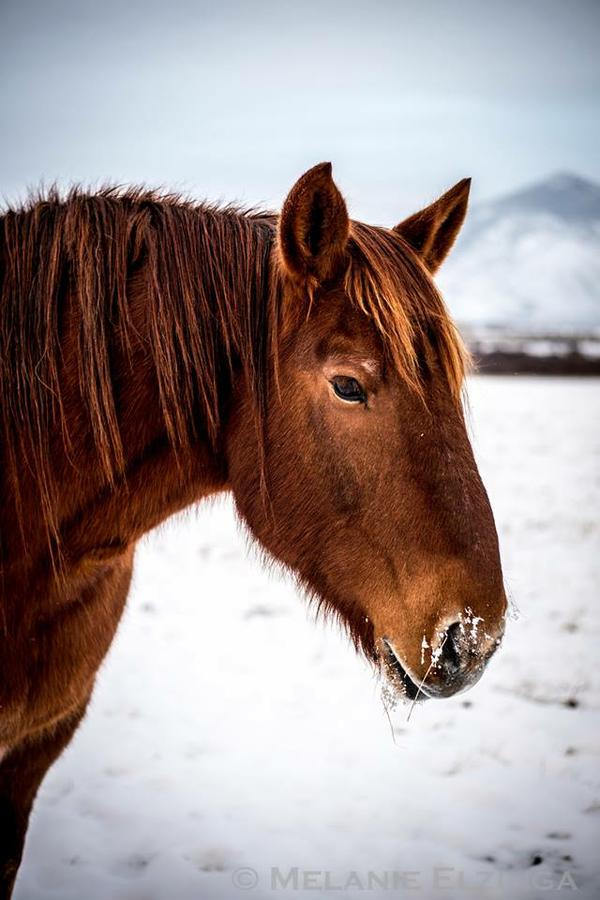
With a gravelly “let’s go,” we moved onward. In about another half hour, we were in the thick of the forest, and several large dead fir trees presented themselves. The snow was nearly 3 feet deep, and although the horses had no problem, the depth would be tough for mankind to negotiate. I dropped my lines and halter roped my teams to some trees, and waded through the snow. Lloyd was still astride his Sandy as he picked out a few pumpkins to harvest for “The Woman.”
It was then I realized that his intent was never to get off. After all, it would be hard going for his short form to negotiate the crusty depth. I smiled at his shrewdness. I unloaded the saw gear and started up one of the dinosaurs. With many pulls, it finally sputtered to life in a blue cloud of stagnant cold-air smoke, and I was good to go.
The saw cut slowly, but steadily. I felled where Lloyd directed me to send them. They crashed hard, and big branches shattered off the main trunk. Not much limbing to do with that frozen wood! The horses had been around falling timber before. They just stood there calmly chewing bit.
After felling 3 or 4, Lloyd set to work skidding logs to the bob. He was a true horseman, and after getting lines in hand, he proceeded to drive his team from his saddle horse. He had leather from his team and Sandy in hand. I hooked them up to logs, and off they went.
I went off falling more timber, and soon smelled smoke. I put saw down to find Lloyd in a tree well of a big fir with a blaze going. A pot of hot water was on the fire, and he had his sandwich on a stick over the flames. He smiled and growled that I should set and stay awhile. We ate lunch and made tea and visited as we always did. He spoke usually of horses and the men who knew them. I readily gave ear. It was a culture that was no more.
Unlike summertime lunches on the range, there was no siesta here. We had to keep moving”¦or freeze. The trees were all felled and part of the loads were ready to roll onto the bobs. We would load the big ends on the bob sleds, and drag them whole tree, with the tips 50 feet behind, all the way to the ranch on the broken trail. With the steepness of the trail down, it would be an easy run once we got going.
Lloyd remounted and grabbed his lines, directing his team with a low and quiet voice to the next log. As they wheeled around, a fir sapling stuck under the one of the Belgians in his charge. It was getting him right in the back of the belly, and Lloyd did not see it. The gelding began to jitter and jolt with the sapling under him and finally leaped off of it while turning a circle around Lloyd. The big horse’s unwilling partner followed lead and soon they were dancing a tight circle around Lloyd on his saddle horse. Lloyd didn’t react quickly enough. The lines that his wizened hands would not let go of soon became his twisted demise as they wrapped tightly around him, while the team ran circles around.
Soon enough, the capture of Lloyd was complete: he was wrapped in leather so much that his arms were unable to move. His plaintive and frustrated attempts at a “Whoa” were unheard by the horses who seemed to be enjoying this. I ran over and reached to stop them from running, but it was too late. With a sudden lunge, they ran off in the direction of the home trail, and launched Lloyd from his horse. Old man disappeared in deep snow, and began to get dragged. As I sprinted to grab their bridles and stop them, I noted Lloyd’s point of disappearance into the deep snow: his battered Stetson lay on top of the smooth white.
I stopped the steeds and tied them off, and quickly started digging for my partner. I found him readily (you just had to follow the leathery lines) and got him stood up. Sputtering some unintelligible and not happy tones (it was hard for me to keep a straight one on). I spun him around in place to get the lines undone, and gave him his hat back. I had to turn away, pretending to do some work with the team, as I grinned uncontrollably.
Soon enough, he was grinning with me, and we finished skidding and loading. With chain binders securely tying the loads to sled, we loaded gear and got ready for the trip down to the ranch.
The sun was already down on us, as Lloyd pulled Sandy’s headgear and tied it to saddle. “He’ll find his own way home”, he growled. Then he got on his bob, and I headed over to mine. Mine was loaded very precariously, so we agreed that I should ride on Blaze’s broad back. I spoke to Blaze after getting on, and she lunged forward with her teammate into the collars and traces. In a couple of tries, the sled broke free and off we went, snaking the logs through the darkening forest.
In the half light, down straight parts of trail, I could see Lloyd off behind me, moving right along with his load. Sandy trotted happily behind all of us. I knew from experience that we were not to stop, to keep the momentum going. Blaze’s heat and her thick fur felt pretty comforting after we broke out of the timber into the open, and were met by a quiet but bracing subzero breeze. I tucked my hands between my legs with reins in hand and gave Blaze slack: she knew the trail home. I was only along for the ride.
The sky darkened and the light of a rising moon bathed the landscape with an ethereal glow. It was then that I heard it. It was a melody, wafting in and out on the breeze. I woke from my self-pitying frozen state. There: I heard it again. I strained my ears over the jingle of harness and chain and realized it was coming from Lloyd, now ghostlike in the distance behind me on the trail. He was singing. It sounded like a Christmas carol, left over in his mind from last week, and his usually gravelly voice had taken on an almost boy-like tone in the cold darkness.
In the frozen cold of a winter night, when time and the arduous life should have erased all such lightness, he still sang. I’ll never forget it. Because it told what he was really made of, and the trials of life never robbed him of joy.
The land and life on it always have gifts to give, and the richest often come from those who have lived their entire lives on it. Happy Trails.

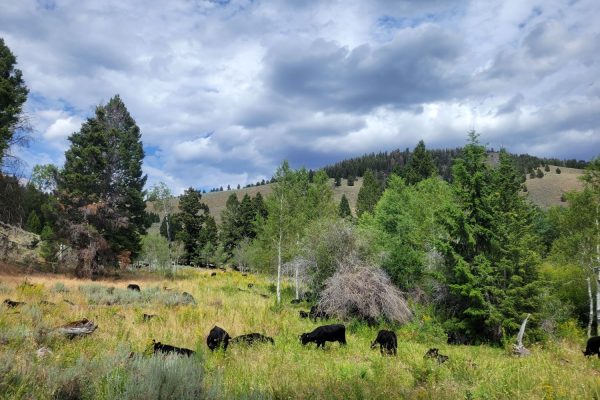



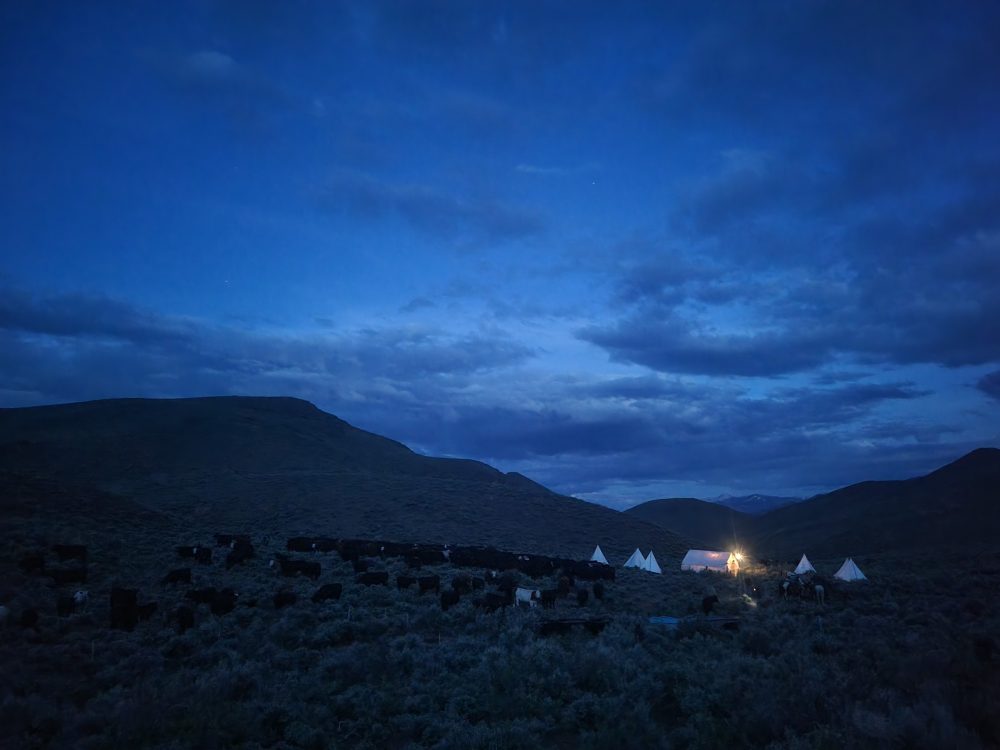
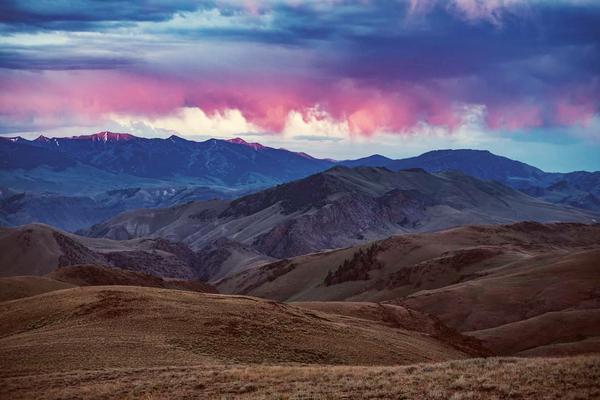
Leave a Reply